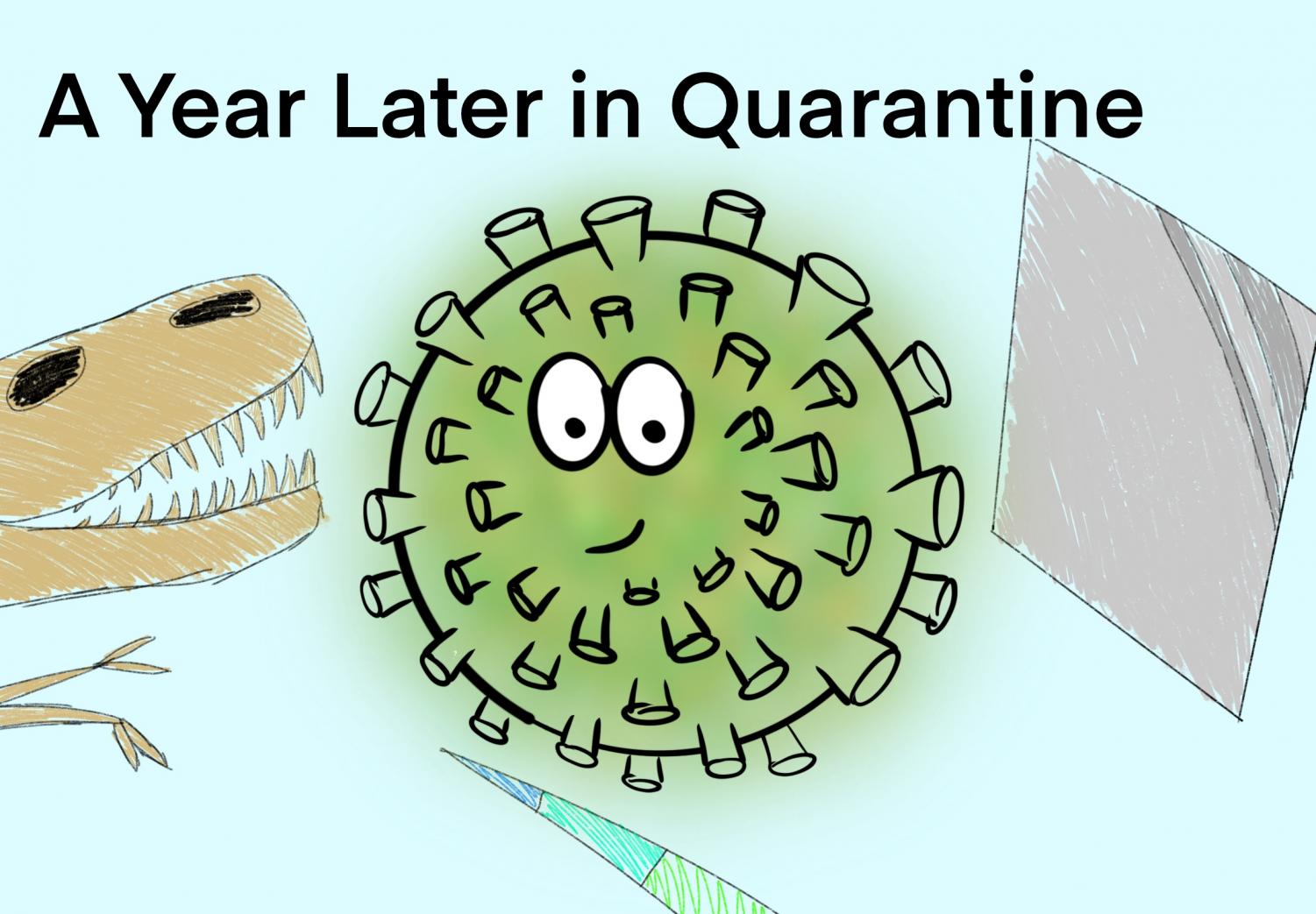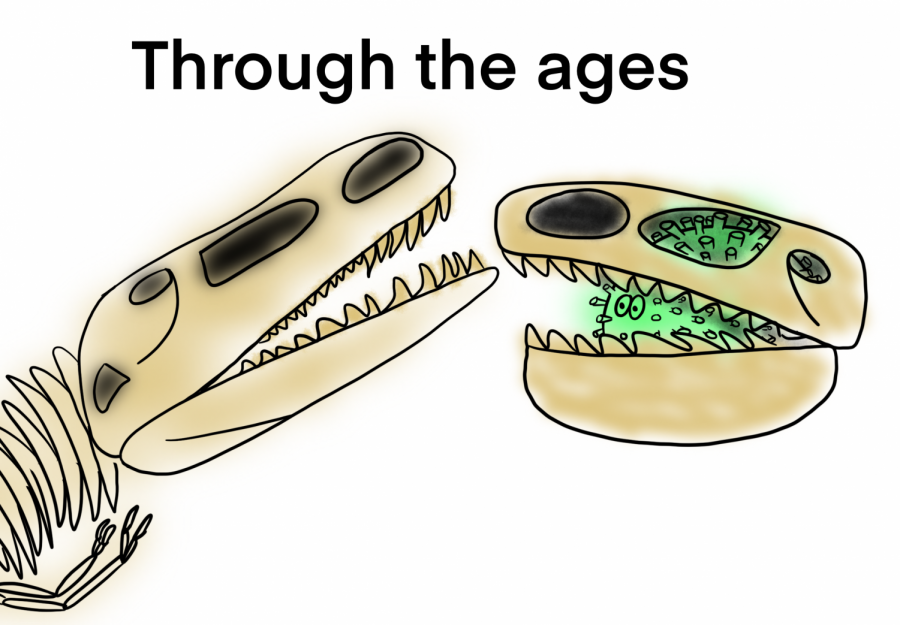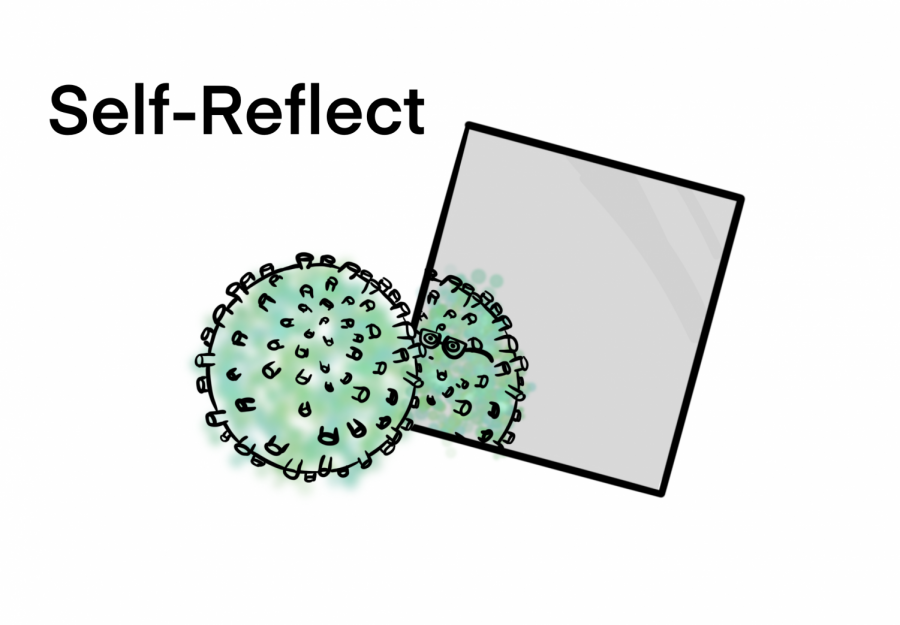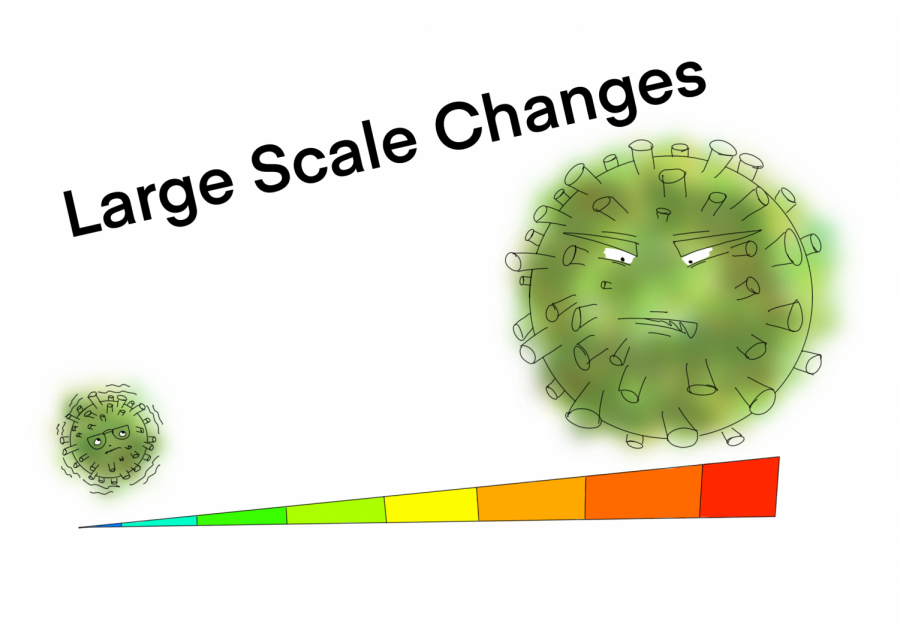Looking back on the year that changed everything
March 13, 2020: the day everything changed. Now, as the world gets ready to move forward, the thing to do just might be to look back.
April 9, 2021
Coronavirus brought about its fair share of negative outcomes, but its few positive outcomes are too often overlooked. Of these, the most notable was surely the way quarantining forced people to slow down and self-reflect during an otherwise hectic time. Now, a year after quarantine began, let’s look back on how much people, especially teenagers, have changed, and how much change they in turn have brought about.
Life in pandemics throughout the ages
One cannot effectively analyze this current global pandemic without reflecting upon similar historical events.
Photo by Sarabeth Wester
What can the century Spanish Flu pandemic tell us about a more modern one? Original art by Sarabeth Wester
In 1918, the Spanish Flu (also known as Influenza) ravaged the globe. The virus only lasted around two years, but its death toll reached an estimated 50,000,000. AP World History teacher and History Department Chair Mr. Whelan just happens to be quite knowledgeable on the subject. “Instead of a flu that mostly affected the elderly and people with health conditions, the Spanish Influenza really took down people who were in the prime of their life,” he explained.
“Similarly to Coronavirus, the Spanish Influenza brought with it mask wearing, social distancing, and the cancellation of events,” added Whelan.
It’s easy to think that living through the Coronavirus has been an event that is alone in its awfulness, but the Spanish Flu serves as an almost comforting reminder that what the world is facing now is nothing new, and that life went back to normal once. If it happened then, it will happen again.
Influenza’s death toll was exponentially higher than Covid-19’s. It killed about a third of the world’s population, and the way in which it affected people was largely random. “Some people would get sick and recover, and others would get sick and be dead the next morning,” explained Whelan. “Covid is like that too. Some people recover quickly, and others never do.”
That is a degree of randomness people rarely encounter, where a mysterious illness might kill you or might just as easily be so innocuous as to be called “asymptomatic.” When people are accustomed to far more certainty, this apparent randomness inspires a change of mentality. People are forced to appreciate life more, because they know that every day they’re alive and healthy is a stroke of good luck. In the 20s, the decade following the Flu, that appreciation for life was the reason for one of the most iconic eras in American history: the Roaring Twenties.
With vaccinations rolling out quicker than ever and the chapter of Covid finally coming to an end, will this generation of pandemic survivors enter into a roaring twenties of their own? Only time will tell.
Self-reflection and growth
Losing a normal year of high school can be a hard pill to swallow. It’s made easier, though, when that lost time still comes with the opportunity to change and grow as a person.
Photo by Sarabeth Wester
What changes did individuals undergo during quarantine? Original artwork by Sarabeth Wester
“Being isolated for so long definitely changed me,” says Junior Sophia Berry. “I was free to explore things that I liked without having to worry about the judgment of others. My sense of self was vastly improved.”
Berry isn’t alone in this sentiment. A trend that has recently been going around the video sharing platform TikTok involves users showing pictures of them before and after quarantining, to show how they have changed and grown without the pressures of the outside world holding them back.
One such video, linked here, gained over one million likes. One of the top comments left on it, which gained over forty-thousand likes itself, read “I honestly think this corona thing is what the world needed for people to heal and find themselves. That’s what I did and I’m way more confident in me.”
What brought about this widespread change in young people? What about a pandemic, which stole a whole year of the time that’s supposed to be the best of their lives, would promote any sort of positive change?
To find out, let’s go back to the very first day of quarantine, one year ago.
March 13, 2020. The last bell rang, and students poured out of their seventh period classrooms with a little bit of extra pep in their steps. Their moods were bolstered by the knowledge that some distant virus was adding a week to their spring breaks.
Sentiments like “I’m so excited to do absolutely nothing for a week” were echoed by millions of students all around the world. Famous last words.
A week turned into two, and two weeks into a month, and all of a sudden, it’s March 13, 2021. 365 days, and life still abides by the guidelines of the CDC.
In just one trip around the Sun, Earth has become a place of masks, stock-piled hand sanitizer, and social distancing. It’s impressive in a bittersweet sort of way how quickly people found their way to a “new normal.”
Humans are remarkably good at adapting to changes in their environments. Whether it be the biological process of maintaining homeostasis or the process of adapting to a more overarching lifestyle change such as surviving in a pandemic, our species has mastered the art of quick change.
Adjusting to life in a pandemic was not the hardest part of the past year. The hardest part was being able to slow down.
People have a tendency to power through any obstacles they face. Rather than reflect on hardships, they fill their schedules with as many things as possible so they aren’t forced to confront their struggles.
That’s the thing about quarantine, though. It was a forced slowing of pace. Being quarantined rigidly for a few months and then less rigidly for the better part of the year meant lots of free time.
One of the only things to do was to think.
“Who am I?” “What is my purpose?” “How can I better myself?”
These are questions that everyone must confront at one point or another, but, as it turns out, a pandemic is a very opportune time to start.
By pondering these things, people, especially teenagers, could begin to gain a better sense of themselves. Away from the feared judgment of peers, they could take some risks too. Try new things, reconnect with family, or focus on what they wanted their lives to become.
It’s hard to come to terms with who you are when you’re constantly surrounded by other people your age and worrying about what they might think. Being alone largely alleviated that problem, and teenagers gained a respite unlike anything even their parents’ generation had known.
Large-scale changes
One cannot effectively speak about the time spent in quarantine without reflecting upon the social movement that gained traction within its context.
Photo by Sarabeth Wester
Aside from individual changes, this pandemic changed the world. In all likelihood, it will continue to do so. Original artwork by Sarabeth Wester
If the summer of 2020 was defined by the pandemic, it was certainly also defined by the BLM movement that it coexisted with. This was a coincidence, right? Maybe not. According to research conducted by Maneesh Arora for the Washington Post, the pandemic fueled protests by worsening people’s financial situations.
Arora found that when people are down on their luck, they are more likely to feel compassion for and provide assistance to oppressed groups. It seems that Coronavirus heightened people’s empathy for their fellow man, perhaps because of the fact that everyone in the world has suffered through this shared experience.
When yet another unarmed Black person was killed, it was as if the country collectively stood up and said, “not again.” We’d been through too much together. As people masked up and went out into the streets, from small and large towns alike, they shared an understanding that they would not tolerate any more senseless deaths.
Given the history of racial injustice in this country, and the long struggle for civil rights, it’s compelling that one of the main catalysts for the growth of the BLM movement was actually a global pandemic.
With that said, the biggest changes that come out of this pandemic may be still to come. When the Spanish Influenza finally abetted, America entered the dynamic era of the roaring twenties, and was forever changed. Only time will tell what the future holds for America when it comes through on the other side of Coronavirus, but history tells us that something big could be on the horizon.
Covid-19 brought profound hardships and tragic loss. But it also spurred some real, positive advances. With a whole year between now and that fateful day in March when everything changed, hindsight is twenty-twenty (or perhaps more accurately, 2020).




Kevin Jiang • Apr 9, 2021 at 6:34 pm
Obviously losing a year of school doesn’t matter that much to you because you’re not a senior. But we as seniors have been looking forward to enjoying our senior year and all the fun that has come with it. But no, senior year was ruined and it’s tough pill to swallow and nothings made it easier. And of course you forgot to mentioned all the looting and destruction of property that went on with the BLM riots. And where was the social distancing at those riots?